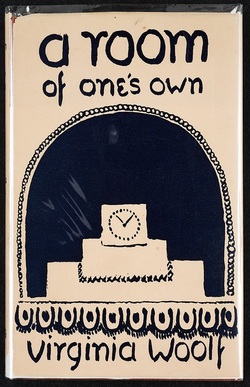
Virginia Woolf's A Room of One's Own famously serves as both an essay and a novel; it is a call for androgynous authorship, and yet serves as a summons for women to equally partake in artistic flourishing.
Woolf delivers her essay under the guise of a false identity; she tells us we may call her "Mary Beton, Mary Seton, Mary Charmichael or by any name you please--it is not of any importance." This device distances Woolf from the popular notion of authors as heroic, path-breaking pioneers, capable of fully reinventing the world around them. For Woolf, specifically identifying a writer twice troubles the issues surrounding 'women and fiction.' First, the myth of the heroic, path-breaking writer defines the purpose of writing as jockeying for hierarchical status, rather than the more complex terms of artistic generation. Second, the myth shrugs aside economic, social, and political obstacles that stand in the way of women and writing. Woolf pursues achievement, not heroics, and when exploring the theme of 'women and literature' she coolly rejects the notion of settling for the pioneering glory of Jane Austen, the Bronte sisters, George Eliot and the handful of other notable forerunners of women's literary achievement.
Women writers, Woolf avers, rarely exist, and when they do they fail to achieve the greatest heights of literary accomplishment. Why? Because they lack economic, mental, and physical security--they lack a room with a lock on the door, and five hundred pounds a year of independent income. They also lack a strong tradition of writing. Society expects men to write. And so society provides men with education, job opportunities, and the mental freedom to produce literature. But society rarely expects women to write, and certainly not to write of their own concerns. Rather, society prefers women to address the concerns of men, and to accommodate those concerns in both thought and action.
In the modern era, both men and women suffer from the emergence of "sex consciousness," which clouds writing with unnecessary dimorphic tension. Woolf considers it fatal to defend or apologize on the basis of gender. Thus, she disparages self-conscious moments like those found in Charlotte Bronte's Villette, where the lead character (a woman) mounts a defense of women vis a vis the opposite sex. Sex consciousness works both ways, so that Rudyard Kipling's adolescent masculine mind is just as hamstrung by the emergence of sex consciousness as any woman writer. Men and women, she asserts, mutually depend upon one another as writers. The best writers, she holds, like Shakespeare and Coleridge, write androgynously. Woolf ends her speech on a note of pessimism. Poor writers cannot achieve much of anything in Britain; their output stands as "poor poetry" that has "not a dog's chance" in the British commonwealth. And modern women, who "have less freedom the son of an Athenian slave," are very, very poor. Yet she hopes that women can, with decades of steady work, eventually create an androgynous master of literary arts--a place for a Judith Shakespeare to flourish alongside her brother William.
Woolf's lecture revels in the difficulties and tensions produced through its narrative complex structure. Rather than speak directly to an audience, Woolf assumes an amorphous identity as a fictional woman; Woolf's text exhorts other writers to 'be yourself,' and yet Woolf writes in the form of another person. Further, Woolf refuses to identify her listeners as women until the middle of the 'lecture,' perhaps to stir androgynous sympathies in the mind of the reader. The complexity of book's structure creates delicious tension between word and action. What begins as an erudite essay on women's fiction morphs into a complex critique of writing as an art form, and a critique of art as existence.
In this critique, I have not mentioned Mary Breton's eye-opening dinner as an outsider at male-centric 'Oxbridge' University. Or the day she spends at the library to understand the relationship between man's obsession with writing about woman, and yet man's historical refusal to allow any woman to craft that literary discourse. Woolf tackles all this, and more. Erudite yet playful, scattered yet clear, Virginia Woolf invents a stained-glass approach to literary criticism--the abstract blends with the iconic, filters nature, and then achieves the transcendent.
 RSS Feed
RSS Feed